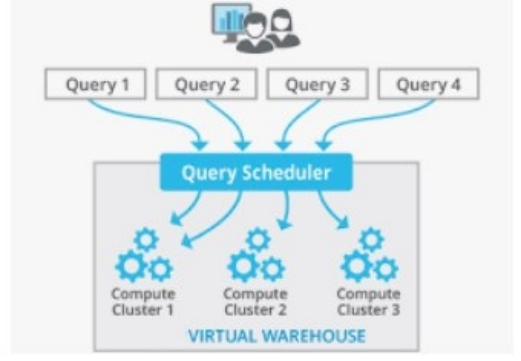Snowflake Virtual Warehouses
- Snowflake
- November 05, 2024
-
Snowflake Virtual Warehouses

Snowflake Virtual Warehouses are clusters of compute resources within the Snowflake platform that are used to process queries and perform data operations. A warehouse provides the required resources, such as CPU, memory, and temporary storage, to perform the operations like Executing SQL SELECT statements that require compute resources (e.g. retrieving rows from tables and views) and Performing DML operations such as Updating rows in tables (DELETE, INSERT, UPDATE), Loading data into tables (COPY INTO <table>) and Unloading data from tables (COPY INTO <location>) in a Snowflake session. While a warehouse is running, it consumes Snowflake credits.
Here are some key points about Snowflake Virtual Warehouses:· Decoupled Compute and Storage:
In Snowflake, compute resources (Virtual Warehouses) are separate from storage. This means you can scale compute independently from storage, allowing you to allocate the right amount of resources for your workload without over-provisioning.
· Elastic Scalability:
Virtual Warehouses in Snowflake are designed for elastic scalability. You can easily scale up or down the compute resources allocated to a Virtual Warehouse based on your workload requirements. This scalability is particularly useful for handling fluctuating workloads or processing large volumes of data.· Concurrency Control:
Snowflake's Virtual Warehouses are capable of handling concurrent queries from multiple users and applications. Snowflake manages concurrency through a patented technology called Multi-Version Concurrency Control (MVCC), which ensures consistent query results even in highly concurrent environments.· Workload Isolation:
Each Virtual Warehouse operates independently, providing workload isolation. This means you can have multiple Virtual Warehouses running concurrently, each serving different users or workloads without impacting each other's performance.· Query Performance Optimization:
Snowflake automatically optimizes query performance within Virtual Warehouses. It utilizes techniques such as automatic query optimization, query caching, and intelligent data distribution to ensure that queries are executed efficiently.· Cost Management:
Since compute resources in Snowflake are billed based on usage, Virtual Warehouses provide cost-effective options for running queries and processing data. You can scale compute resources up or down as needed to optimize costs based on your workload patterns.· Flexibility:
Snowflake supports different types of Virtual Warehouses to cater to various use cases. For example, you can create separate Virtual Warehouses for different teams, departments, or specific workloads, each with its own configuration and resource allocation.Overall, Snowflake Virtual Warehouses offer a flexible, scalable, and cost-effective solution for processing data and running analytical workloads in the cloud. They play a crucial role in enabling organizations to harness the power of Snowflake's cloud-native data warehousing platform for their data analytics and business intelligence needs.
ssssssStart Your Data Journey Today With MSAInfotech
Take the first step towards data-led growth by partnering with MSA Infotech. Whether you seek tailored solutions or expert consultation, we are here to help you harness the power of data for your business. Contact us today and let’s embark on this transformative data adventure together. Get a free consultation today!

We utilize data to transform ourselves, our clients, and the world.

Partnership with leading data platforms and certified talents



